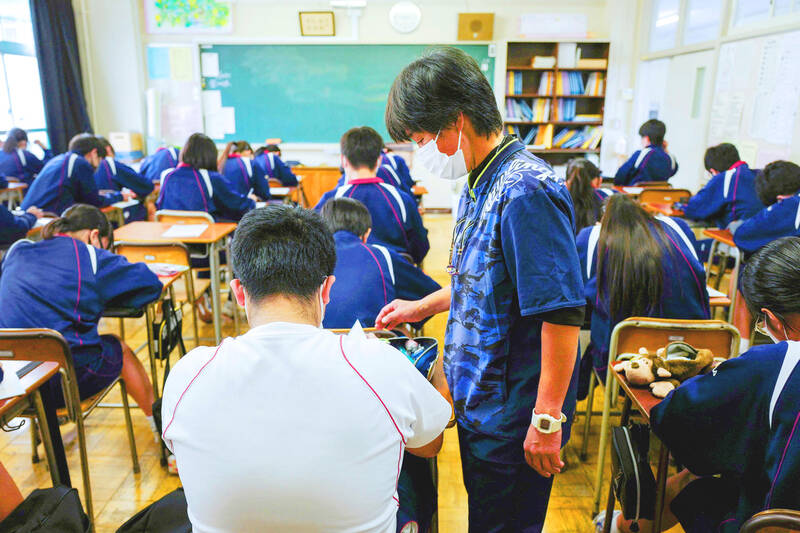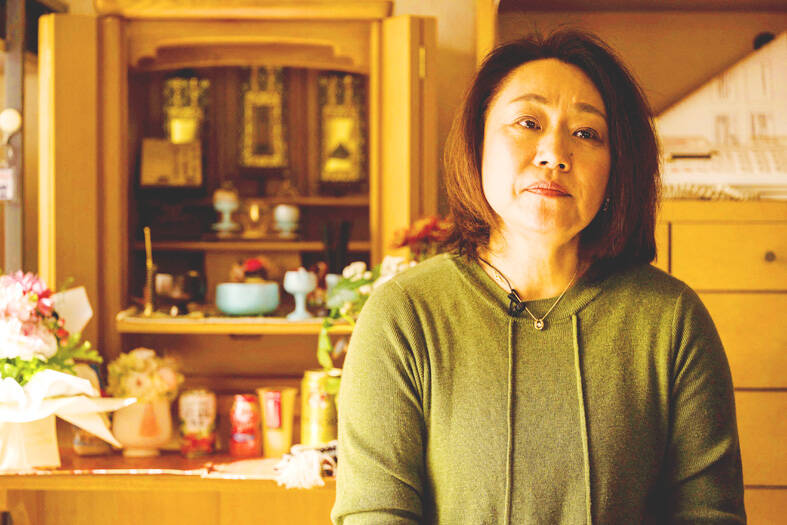In one of his last diary entries, Japanese teacher Yoshio Kudo lamented workdays that started early and could last until nearly midnight. Two months later, he suffered “karoshi” — death from overwork.
Kudo’s taxing schedule was far from an exception in Japan, where teachers work some of the longest hours in the world, saddled with tasks from cleaning and supervising school commutes to after-school clubs.
A 2018 Organisation for Economic Co-operation and Development survey found that Japanese middle-school teachers work 56 hours a week, versus an average 38 hours in most developed countries.

Photo: AFP
Yet that still fails to account for their astonishing amounts of overtime.
One investigation by a union-affiliated think tank found that school teachers work an average 123 hours of overtime each month, pushing their weekly workload well beyond the so-called “karoshi line” of 80 hours.
Teachers say they are reaching breaking point, and some have challenged the culture with lawsuits. This year, Japan’s ruling party established a task force to study the issue.

Photo: AFP
That came too late for Kudo, a middle-school teacher, who in 2007 died of a brain haemorrhage at the age of 40.
At his funeral, stunned students told his wife Sachiko that the lively physical education teacher was the “furthest imaginable person from death.”
“He just loved working with kids,” Sachiko, 55, said.
However, in his final weeks, he was struggling with his hours.
“Toward the end, he was telling me that teachers should stop working like this and that he wanted to lead that change in the future,” his widow said.
Japanese authorities have ordered steps including outsourcing and digitalizing some tasks.
“Our measures to reform work conditions for teachers are making steady progress,” Japanese Minister of Education, Culture, Sports, Science and Technology Keiko Nagaoka told the Japanese parliament in October.
However, she said that many “continue to work long hours” and “efforts need to be accelerated.”
Japanese Ministry of Education, Culture, Sports, Science and Technology data shows a gradual decline in overtime, but experts see little fundamental change.
From reams of paperwork to tasks like lunch distribution, leading daily cleaning sessions with students and monitoring children on their way to and from school, teachers in Japan “have in a way become handymen,” school management consultant Masatoshi Senoo said.
“What should really be the responsibility of parents sometimes spills over onto teachers, who can even be sent to apologize to local residents when students misbehave at parks or convenience stores,” he said.
One of the most all-consuming tasks is the supervision of student sports and cultural “club” activities, typically conducted after school and on weekends.
“Being assigned as primary supervisor of one of these clubs usually means you have to kiss your weekends goodbye,” said Takeshi Nishimoto, a high-school history teacher in Osaka.
In June, Nishimoto, 34, won a rare lawsuit seeking compensation for stress from overwork.
He filed the suit after coming close to a nervous breakdown in 2017, when the then-rugby club supervisor worked 144 hours of overtime in a single month.
Experts say teachers are particularly vulnerable to overwork because of a decades-old law that essentially prevents them from being paid for overtime.
Instead, the law adds eight hours’ worth of extra pay to their monthly salaries, a framework that Nishimoto says results in “making teachers work without limits for fixed pay.”
Masako Shimonomura, a middle-school physical education teacher in Tokyo’s Edogawa ward, said it can feel hard to take a proper break in her day.
“Not everything about this job is ‘black’ though,” she said, using a Japanese term for exploitative labor.
“There are some moments I live for, like watching students in my softball club shine and smile at tournaments,” said the 56-year-old, whose desk is covered with stacks of files and documents.
However, she said she fears that if conditions do not improve, “the image of our profession as ‘black’ will dominate for younger generations.”
An investigation by the Mainichi newspaper revealed that in the decade to 2016, there were 63 public school teacher deaths classified as caused by overwork.
However, it took Kudo’s widow five years to get her husband’s death recognized as karoshi, a task complicated by the lack of records for his work hours.
She said that teaching is often seen as a “sacred job” devoted to children, so anything viewed as selfish — including taking note of hours worked — can be frowned upon.
“So many teachers regret that they lived their lives without stopping to enjoy the growth of their own children,” she said.
A former schoolteacher herself, Sachiko now heads an anti-karoshi group in central Japan.
“I feel like my husband and I are working together to follow through on his last words — that he wants to change the working practices of teachers.”

In Italy’s storied gold-making hubs, jewelers are reworking their designs to trim gold content as they race to blunt the effect of record prices and appeal to shoppers watching their budgets. Gold prices hit a record high on Thursday, surging near US$5,600 an ounce, more than double a year ago as geopolitical concerns and jitters over trade pushed investors toward the safe-haven asset. The rally is putting undue pressure on small artisans as they face mounting demands from customers, including international brands, to produce cheaper items, from signature pieces to wedding rings, according to interviews with four independent jewelers in Italy’s main

Macronix International Co (旺宏), the world’s biggest NOR flash memory supplier, yesterday said it would spend NT$22 billion (US$699.1 million) on capacity expansion this year to increase its production of mid-to-low-density memory chips as the world’s major memorychip suppliers are phasing out the market. The company said its planned capital expenditures are about 11 times higher than the NT$1.8 billion it spent on new facilities and equipment last year. A majority of this year’s outlay would be allocated to step up capacity of multi-level cell (MLC) NAND flash memory chips, which are used in embedded multimedia cards (eMMC), a managed

Japanese Prime Minister Sanae Takaichi has talked up the benefits of a weaker yen in a campaign speech, adopting a tone at odds with her finance ministry, which has refused to rule out any options to counter excessive foreign exchange volatility. Takaichi later softened her stance, saying she did not have a preference for the yen’s direction. “People say the weak yen is bad right now, but for export industries, it’s a major opportunity,” Takaichi said on Saturday at a rally for Liberal Democratic Party candidate Daishiro Yamagiwa in Kanagawa Prefecture ahead of a snap election on Sunday. “Whether it’s selling food or

In the wake of strong global demand for AI applications, Taiwan’s export-oriented economy accelerated with the composite index of economic indicators flashing the first “red” light in December for one year, indicating the economy is in booming mode, the National Development Council (NDC) said yesterday. Moreover, the index of leading indicators, which gauges the potential state of the economy over the next six months, also moved higher in December amid growing optimism over the outlook, the NDC said. In December, the index of economic indicators rose one point from a month earlier to 38, at the lower end of the “red” light.